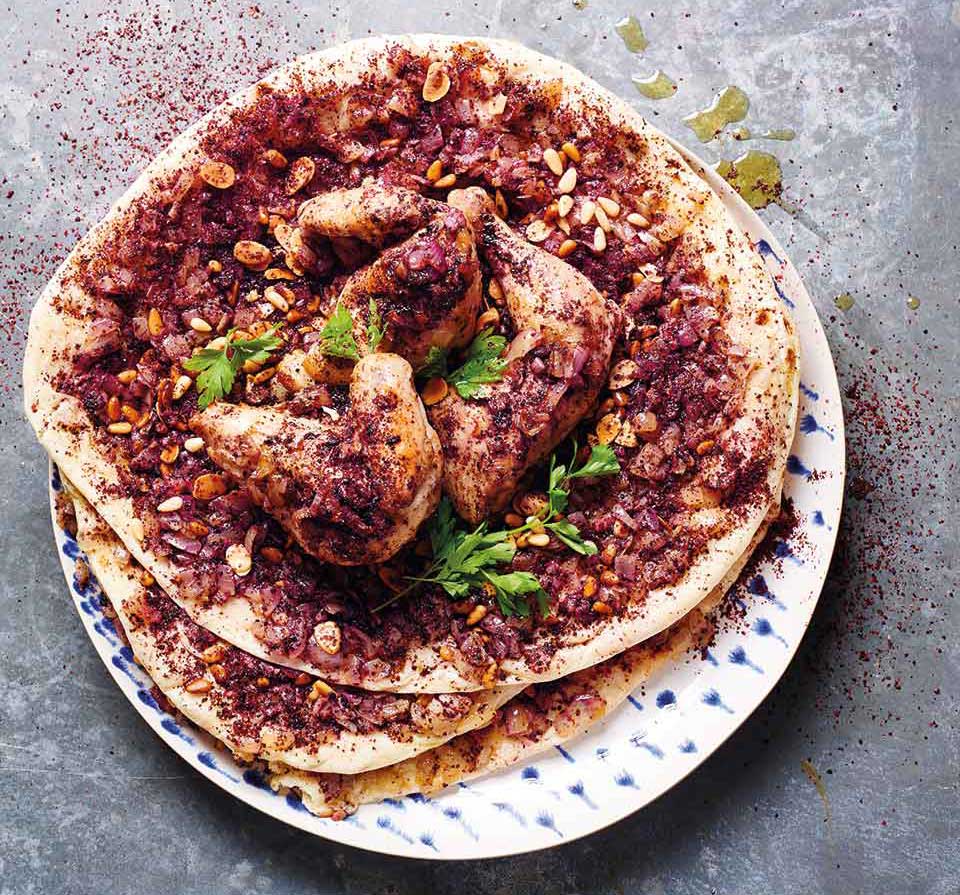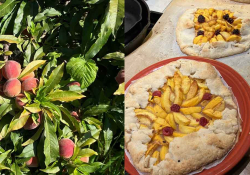Palestine on Your Plate
No portrait of Palestine is complete without an understanding of its cuisine. Here, British Palestinian chef Joudie Kalla introduces two classic dishes.

Mussakhan – Auntie Lamia’s Way
Chicken Cooked with Sumac, Olive Oil, and Onions
Mussakhan, one of the national dishes of Palestine, is just one of those dishes that you can’t stop eating once you have started. You absolutely have to eat it with your hands—none of this silly fork and knife business please!—the flavor is just more exaggerated when eaten by hand. In Ramallah, in Palestine, they have just submitted the largest mussakhan, which has been accepted into the Guinness World Records. It is more than 4 meters (13 feet) long and weighs more than 1,350kg (2,976 lb)—I would love to have a bite of that! This is a very simple, hearty, full-of-flavor dish that you must try. It should be very oniony and dripping with olive oil. The sumac really is the star of the show and turns the bread a beautiful magenta color. Auntie Lamia always used to make this when she was coming to the end of her visit to London, before going back home to Palestine—it was always her farewell dish.
Serves 6–8
1 whole large chicken, skin on and cut into 4–6 pieces
5 cardamom pods
2 tablespoons sea salt
550–650ml (19–22 fl oz) olive oil
12–14 onions, chopped
1 teaspoon ground cumin
½ teaspoon black pepper
½ teaspoon ground cinnamon
150g (5½ oz) sumac
4–6 flatbreads
75g (2¾ oz) toasted pine nuts
75g (2¾ oz) toasted almonds
fresh flat-leaf parsley, chopped, to serve
Put the chicken in a saucepan of water with the cardamom and 1 tablespoon of the salt and boil for 1 hour.
Heat the oil in a frying pan and sauté the onions, remaining salt, cumin, black pepper, and cinnamon for about 45 minutes over a low heat until completely soft but not browned.
Preheat the oven to 220°C convection (240°C/465°F).
Once the chicken has boiled, remove it from the water (you can keep the stock and use it for another recipe, if you like).
Place about 1 tablespoon of the cooked onions onto each piece of chicken and sprinkle some sumac over the top of each one. Place the chicken pieces on a baking tray and bake for 5 minutes until slightly browned on top.
Slather each flatbread with onions, scatter generously with sumac, adding bits of chicken and some toasted nuts and parsley to each one. Repeat for all the remaining breads and pieces of chicken and serve. Rip pieces of bread with the chicken, get messy, and eat with your hands.

Molokhia
Jute Mallow Cooked Two Ways
Molokhia (jute mallow) is one of dozens of names for the leafy plant of the Corchorus species, which is commonly used in Palestinian, Egyptian, and other Middle Eastern cooking. It is known to be the food of kings and pharaohs in Egypt (the word molouk means king or royalty). It has a wonderfully relaxing and comforting effect when you eat it. My sister Tania often makes this to remind her of her childhood. I often cook these two molokhia dishes at the same time as they are so easy to make, and it is nice to enjoy the different dishes served together.
Serves 4
1 whole chicken
1–1.5 liters (1¾–2½ pints) water
1 large onion, quartered
4 cardamom pods
1 400g (14 oz) packet frozen molokhia (jute mallow), smooth
50ml (2 fl oz) olive oil
4 garlic cloves, crushed
1 quantity of vermicelli rice
sea salt and black pepper
toasted khubez (pita bread) and lemon wedges, to serve
For the dressing:
2 shallots, finely diced
1 green chili, chopped
3 tablespoons red wine vinegar
Put the chicken in a large saucepan with 500ml (18 fl oz) of the water, the onion, and cardamom pods. Season with salt and pepper, bring to the boil, lower the heat to a simmer, and cook for about 1 hour. Strain and reserve the stock, pouring 500ml (18 fl oz) into a clean saucepan. Shred the chicken meat and set aside.
Add the molokhia (jute mallow) to the chicken stock, bring to the boil, and then reduce the heat to a simmer for about 15 minutes.
While the molokhia is cooking, heat the olive oil in a pan over a medium heat and cook the garlic until slightly browned. Add this to the molokhia and mix.
Mix all the dressing ingredients together in a small bowl and season with salt. Divide the vermicelli rice between four serving bowls and top each bowl with molokhia soup and some shredded chicken. Drizzle over some dressing and serve with khubez (pita bread).
Tip: Use 4 chicken breasts instead of a whole chicken if you are short on time, and only cook for 20 minutes to make the chicken stock.
You can also make a dry version of this dish, known as molokhia warak. Heat 50ml (2 fl oz) olive oil in a saucepan over a medium to high heat and sauté 1 large chopped onion and 1 whole head of peeled and sliced garlic cloves for about 10 minutes, until softened but not browned. Add 1 sliced green chili and 250g (9 oz) fresh molokhia leaves or 400g (14 oz) frozen and thawed leaves and sauté together for several minutes. Add 250ml (9 fl oz) chicken stock and 1 teaspoon salt and cook for about 10–12 minutes, until the leaves have soaked up all the liquid and are completely soft. Serve with khubez (pita bread) and lots of lemon juice squeezed on top.
London







